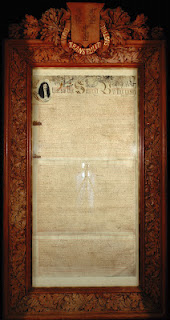 |
| Christy K. Robinson |
My guest today is Christy K. Robinson, who is hard at work writing a novel about Mary Dyer. Mistress Dyer is a well-known resident of Newport, Rhode Island, and is featured in my "Rebel Puritan." I asked Christy what attracted her to Mary, and she can tell you in her own words:
Why Mary Barrett Dyer?
By Christy K Robinson
Historical fiction has been my favorite literary genre since
I was a young girl. I’ve learned that several of my author friends read my
favorite book series on the Childhoods of Famous Americans when we were
kids, and it shaped our discovery of history and historical fiction by humanizing
icons of history and making them accessible to children. It tickled our
imaginations to learn about culture and what life might have been like for
Virginia Dare, Martha Washington, or Abigail Adams, as children. (There were
boys in the series, too, of course.)
 |
| Mary Dyer and Christy Robinson |
My mother was chronically ill, and she drafted me to help
her at genealogy and history archives with the fetch-and-carry jobs, or
searching the reference files (you know, the little card drawers at the book
place, that preceded the search engine). We traced many of our lines back
through renaissance and medieval eras to European royalty. One of our most
important discoveries in the 1970s was the confirmation that we were 11 and 12
generations descended from Mary Barrett Dyer, the 17th-century
Quaker martyr. In the 1970s and 80s, we believed that Mary was hanged by those
mean Boston Puritans for her religious beliefs, “simply for being a Quaker.” Unfortunately, that belief persists in countless web
pages today.
Mary Dyer had several opportunities to avoid prison and
execution. She could have lived her life in peace and safety, doing anything
she wanted to, in Rhode Island, the colony she co-founded. But she
intentionally returned to Boston several times to defy her banishment-on-pain-of-death
sentence, until she forced their hand and they executed her. It’s not that she
wanted to die, but that she was willing
to die to shock the citizens into stopping their leaders from the vicious
persecution of Quakers and Baptists. Whippings such as Herodias Gardner’s. Mary
and other Quakers believed they were called by God to “try the bloody law,” the
law that required torture, bankrupting fines, exile, and death for dissenters.
 |
| 1662 Rhode Island charter |
Mary’s sacrifice and civil disobedience worked. After her
death in June 1660, a petition to King Charles II resulted in a
cease-and-desist order to the Puritan theocracy in New England; and the king’s
Rhode Island charter of 1662 (which replaced previous religiously-liberal
charters) specifically granted liberty of conscience and separation of church
and civil powers in Rhode Island Colony. One hundred thirty years later, the
religious-freedom concept modeled by Rhode Island became part of America’s Bill
of Rights to the Constitution.
Religious liberties (to practice religion or not without
interference of the government) and those who would legislate their morality
upon others still clash today, 350 years later. That’s one of the things that compels me to write of a strong-willed
woman. Mary Dyer sacrificed her will and her life of ease and wealth, with
husband, children, grandchildren, respect and influence for the good of
hundreds of people in her own time, and untold hundreds of millions who came
after her.
The genealogy hobby is inspiring, educational, and fun. I’m
32 generations down the tree from Eleanor of Aquitaine, Christy English’s muse.
Eleanor’s son John was forced to agree to the Magna Carta, a charter of
liberties which has been the model of constitutions around the world. On
another line, I’m 12 generations down from Mary Barrett Dyer, whose sacrifice
laid the groundwork for the human rights in the US Constitution. It’s fun to
speculate what molecules of DNA have come down to me from those two, or from
the thousands of other strong, resourceful, and intelligent women in the family
pedigree. They’re the people whose actions and principles formed our society
and culture today. They were not wimps. And neither are we.
Christy K. Robinson is an author and editor whose book "We Shall Be Changed" was
published in hardcover in 2010. She's currently researching and writing a
historical novel on Mary Barrett Dyer, 1611-1660. You can reach Christy at http://christykrobinson.com/#
Christy also has an excellent blog about William and Mary (Barrett) Dyer at http://marybarrettdyer.blogspot.com and I urge you to check it out!
Mary Barrett Dyer was one of my great grandmothers.
ReplyDelete